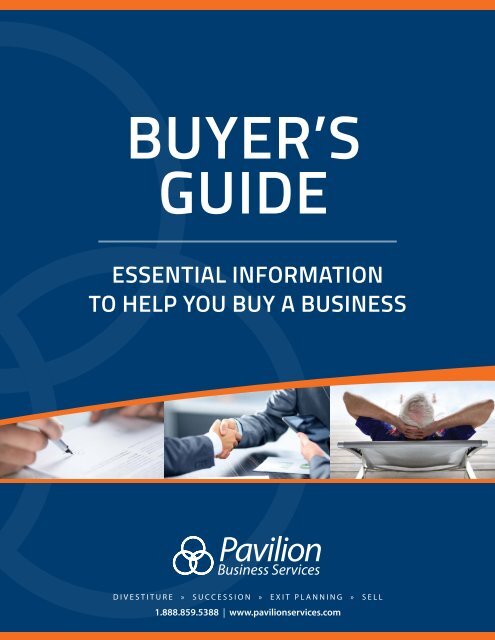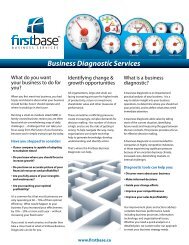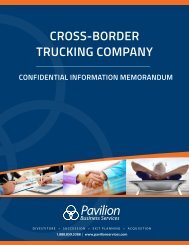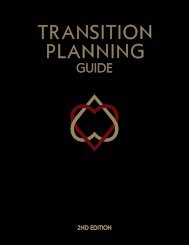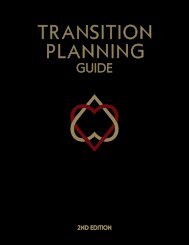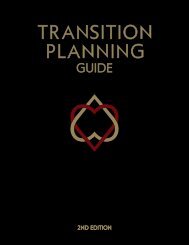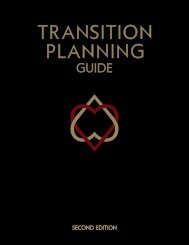Buyers Guide
You also want an ePaper? Increase the reach of your titles
YUMPU automatically turns print PDFs into web optimized ePapers that Google loves.
BUYER’S<br />
GUIDE<br />
ESSENTIAL INFORMATION<br />
TO HELP YOU BUY A BUSINESS<br />
DIVESTITURE » SUCCESSION » EXIT PLANNING » SELL<br />
1.888.859.5388 | www.pavilionservices.com
Dear Buyer,<br />
Buying a business is a major investment and a powerful growth opportunity for your company. This guide provides<br />
an overview of the main steps and considerations for private buyers. It considers practical advice based on our own<br />
experience managing business transactions for our clients over the years.<br />
In most cases, it is easier for a new business owner to purchase an existing business rather than trying to set up a new<br />
business from scratch. You will benefit from established infrastructure, business processes, customer relationships,<br />
skilled employees, supply channel agreements and cash flow.<br />
The purchase of a business involves risk. A patient approach to buying a business can result in significant growth for your<br />
business. Patience is key and it’s vital to take a closer look at the business you wish to purchase.<br />
When you’re searching for a business to purchase, all of your emphasis should not be placed on the business’ financials.<br />
Weight your decision and consider other factors, like whether you’re passionate about the industry and if the business’<br />
sector is an ideal fit. Be honest with your broker about your finances, it will allow the broker to understand your true<br />
financial capabilities to purchase the business and save time for all parties involved.<br />
In this guide, we will review the following three core processes to buying a business:<br />
1. Finding the right business<br />
2. Making an offer to purchase the business<br />
3. Completing the transaction<br />
This guide is comprehensive and covers the overall range of details related to the process of buying a business. However,<br />
the content is general in nature and does not substitute early and professional advice as you navigate potential<br />
acquisition opportunities.<br />
Yours sincerely,<br />
Greg Spafford<br />
Managing Director
Table of Contents<br />
Finding a Business 3<br />
Why is the Business for Sale?<br />
5<br />
How Much is the Business Worth?<br />
5<br />
5 Step Method of Valuing a Business<br />
6<br />
What is the Business Owner Selling?<br />
7<br />
Does the Sale Include Real Estate?<br />
7<br />
Is the Transaction a Share Sale or Asset Sale?<br />
8<br />
How can the Business be Financed?<br />
9<br />
Making an Offer<br />
10<br />
What is Included in a Letter of Intent?<br />
11<br />
What is the Timeline for Completion?<br />
12<br />
Who is Part of Negotiations?<br />
12<br />
What is Due Diligence?<br />
13<br />
Completing the Transaction<br />
15<br />
What Happens on the Closing Date?<br />
15<br />
Contact Pavilion Business Services<br />
To learn more about the various exit options you have as a business<br />
owner and how we can help you successfully sell your company –<br />
call us to arrange an exploratory meeting and discuss your options<br />
in a confidential manner.<br />
1.888.859.5388<br />
www.pavilionservices.com<br />
2
FINDING A BUSINESS<br />
Before diving into the financial documents, key employee<br />
profiles and legal contracts that are part of buying a new<br />
business, take a moment to ask yourself these questions:<br />
WHY AM I BUYING A BUSINESS? – Are you<br />
creating employment for yourself, adding the<br />
company to another that you already own or<br />
looking for a short-term return on your investment?<br />
Have you done your own research and analysis to<br />
understand how an acquisition will be a part of<br />
your current operations? There are many reasons to<br />
buy a business so make sure you understand your<br />
own motivations first.<br />
Place weight on other factors than just the<br />
company’s financials. Are you passionate about the<br />
industry? Are you motivated to own and operate<br />
the business? Are there changes you can make to<br />
the business that would make the business more<br />
successful?<br />
HOW MUCH CASH DO I HAVE TO INVEST? –<br />
Sellers will want to know up-front that you are<br />
serious with your intentions to purchase the<br />
business. They will be looking for a deposit to show<br />
serious interest.<br />
Be honest with your broker about your finances,<br />
it will allow the broker to understand your true<br />
financial capabilities to purchase the business and<br />
save time for all parties involved.<br />
HOW MUCH FINANCING WILL BE AVAILABLE<br />
TO ME? – Talk to your financial advisors before<br />
going into negotiations. This will confirm your<br />
commitment to the process to the seller and make<br />
your offer more attractive when others are also<br />
presented at the table.<br />
HOW INVOLVED DO I WANT TO BE WITH<br />
RUNNING THE BUSINESS? – The current owner<br />
may have been very involved with the day-to-day<br />
management of the business or they may have a<br />
strong management team in place to keep all areas<br />
of the business in line. Evaluate your own strengths<br />
to understand the role you would like to take as the<br />
new owner of the business.<br />
HOW COMFORTABLE AM I WITH RISK? – There is<br />
inherent risk with any business transaction. Come<br />
to terms with this early in the process to avoid cold<br />
feet as the deal comes closer to completion. Legal<br />
and financial advice can provide some direction<br />
on acceptable levels of risk and the terms of the<br />
deal that can be put in place to minimize personal<br />
exposure.<br />
WHAT IS MY TIMELINE TO COMPLETE THIS<br />
TRANSACTION? – Business transactions often take<br />
months to complete and there are a number of<br />
different professionals involved in the process. It is<br />
essential to allow adequate time for investigation<br />
and negotiation to enable a positive outcome.<br />
3
Who is my Support Team?<br />
The seller will often be represented by a Business Broker<br />
or a Merger and Acquisition Specialist throughout the<br />
negotiation and sale process. They will also have legal<br />
and financial advisors to ensure their best interests are<br />
maintained throughout the negotiation process.<br />
As a buyer, you should also have a support team offering<br />
legal and financial advice to ensure your own interests are<br />
fairly represented in the negotiation process.<br />
Registering Your Interest To<br />
Purchase a Business<br />
The business you are considering to purchase is probably<br />
listed with a Business Broker or a firm that specializes in<br />
mergers and acquisitions. In order to get more information<br />
about the business that is listed, you will be asked to formally<br />
register your interest in buying the business.<br />
For listings represented by Pavilion Business Services,<br />
all buyers are required to complete in full the <strong>Buyers</strong><br />
Registration Form that is available online. This information<br />
is used to assess the sincerity of the interest from a<br />
potential buyer and to generate preliminary non-disclosure<br />
documents before sharing further detailed information<br />
about the business listing for sale.<br />
Signing a Non-Disclosure Agreement<br />
The seller will be concerned about confidentiality throughout<br />
the process. Information needs to be presented to you as a<br />
potential buyer, however it is essential that information is not<br />
gathered for other purposes that will undermine the sellers’<br />
current operations.<br />
The Non-Disclosure Agreement (NDA) is signed by any<br />
interested buyers who wish to get additional information. It<br />
is delivered to the Business Broker and a copy is retained by<br />
the buyer. This legal document protects any unauthorized<br />
disclosure of private information that is provided by the seller<br />
throughout the negotiation process.<br />
Reviewing the Business Profile<br />
Once a NDA is signed, the broker will release a Business<br />
Profile, also known as a Confidential Information<br />
Memorandum (CIM) that presents key information about the<br />
business opportunity that is for sale. The Business Profile may<br />
include an overview of the following:<br />
• Description of the Business<br />
• Company History<br />
• Location, Facility and Premises<br />
• Products and/or Services Descriptions<br />
• Administration and Operations<br />
• Sales and Marketing<br />
• Historical Financials<br />
• Competitive Overview<br />
• Market Overview<br />
• Growth Opportunities<br />
The Business Profile includes preliminary information to<br />
help guide a buyer’s decision to understand more about the<br />
business opportunity that is being presented and determine<br />
if the business meets the buyers selection criteria.<br />
4
We could offer this similar statement to buyers: the business<br />
is worth the best price and the best terms that the seller is<br />
willing to accept.<br />
There is no magical formula or correct value to establish<br />
the price of a business. The offer will often be based on a<br />
business valuation that has been professionally prepared<br />
and is available to qualified buyers to review. Some areas of<br />
consideration:<br />
Historical Financials<br />
Past financial results are a good indication of future<br />
performance. Take into consideration how your personal skill<br />
set could elevate the business for stronger results.<br />
WHY IS THE BUSINESS<br />
FOR SALE?<br />
Business owners exit their business for several reasons and<br />
a buyer is completely within their rights to ask questions<br />
about the seller’s motivation to exit. A seller should be able<br />
to present a clear reason for their intent to sell the business,<br />
this could include:<br />
Revenue Forecast<br />
Look for trends to indicate if revenue forecasts are realistic.<br />
Examine short-term peaks as they may be related to less<br />
profitable promotional activity that would not be wise to<br />
repeat.<br />
Market Saturation<br />
If there are several similar businesses in a desired market, the<br />
acquisition price may drop due to increased competition.<br />
Similarly, if there are a limited number of businesses<br />
available to acquire in a particular market there may be a<br />
number of buyers negotiating offers for the same business<br />
opportunity.<br />
• The achievement of established business goals<br />
• Retirement<br />
• Relocation<br />
• Health or family concerns<br />
• Death of the former owner<br />
Be wary of sellers who are not clear on their reason to exit.<br />
This could be a red flag for the current operations of the<br />
business that has yet to be discovered and disclosed to you<br />
as a potential buyer.<br />
How Much is the Business Worth?<br />
When advising clients who are selling their business, we<br />
often say that the business is worth as much as a buyer is<br />
willing to pay.<br />
A stagnant or downward trend<br />
in financials does not always<br />
mean the business is not worth<br />
buying. Owner fatigue or a lack<br />
of motivation to operate the<br />
business at its optimal level can<br />
be reflected in the company’s<br />
financials. If you are patient<br />
and motivated, you can take the<br />
business to a new level.<br />
5
5 STEP METHOD TO<br />
VALUING A BUSINESS<br />
Obtain accurate financials for the last three to five<br />
years. Ideally this will include Audited Statements,<br />
Review Engagement or Notice to Reader.<br />
Analyze the Income Statement and Balance Sheet<br />
for at least the last three to five years. Reconstruct<br />
or normalize the income and expenses as<br />
appropriate. It is best to work with an Accredited or<br />
Certified Business Valuator for this task.<br />
Tentatively distribute the overall business value<br />
between the various tangible and intangible assets.<br />
This apportionment of the value will most likely<br />
become part of the negotiations between the<br />
buyer and seller. This last step is also important<br />
because this is where you determine the actual<br />
business assets that you are going to purchase.<br />
Once the Income Statements and Balance Sheets<br />
have been adjusted (normalized), capitalize the<br />
available cash flow of the business according to a<br />
return on investment (ROI) which is appropriate for<br />
your expectations and the risks involved in business<br />
ownership to arrive at a preliminary valuation.<br />
Determine if any inventory or assets are obsolete.<br />
Well maintained assets at transfer will help ensure<br />
positive future cash flows in the business.<br />
In most instances, the Pavilion team<br />
has conducted a business valuation<br />
by an accredited Business Valuator<br />
for the seller. This information may<br />
be available to qualified buyers<br />
who meet the financing criteria and<br />
signed a Letter of Intent (LOI) for the<br />
purchase of the business.<br />
6
What is the Business Owner Selling?<br />
There are two types of assets that will be included in the<br />
business transaction. Your purchase will outline what is<br />
included from these tangible and intangible assets.<br />
Assets<br />
Tangible<br />
Real-estate (land, building, lease)<br />
Inventory<br />
Furniture<br />
Equipment<br />
Existing orders from customers<br />
Accounts receivable<br />
Exisiting employees and customer contracts<br />
Does the Sale Include Real Estate?<br />
Real estate is a major asset that may affect the sources of<br />
financing and the price you pay for the business. The transfer<br />
of real estate may include any of these components:<br />
• Outright purchase of the business premises (land and<br />
building) along with the sale of the business<br />
• Lease of the property from the seller<br />
• Lease of the property assigned to you if it is not currently<br />
owned by the seller<br />
Generally, it is in the buyer’s best interest to purchase the<br />
real estate with the business when it is currently owned by<br />
the seller. The real estate should be valued along with the<br />
business as an integral part of the operations.<br />
The existing location of the business may be vital to current<br />
operations. Retail and service locations that draw on a<br />
physical establishment for the customer-base need to be<br />
protected so you can continue operations with a reasonable<br />
expectation of established or loyal customers.<br />
Intangible<br />
Goodwill<br />
Trade names and trademarks<br />
Patents and licences<br />
Customer lists<br />
Copyrighted material<br />
Proprietary information<br />
Seller’s agreement not to compete<br />
7
Asset Sale<br />
IS THE TRANSACTION A<br />
SHARE SALE OR ASSET<br />
SALE?<br />
If the business is not incorporated and is run by a sole trader<br />
or a partnership, there are no shares available for purchase.<br />
The sale is comprised of the assets – including future<br />
contracts and goodwill – and is sold by the seller as an Asset<br />
Sale.<br />
When the business is owned by a company, the business sale<br />
transaction can be completed as either an Asset Sale or as a<br />
Share Sale. With a Share Sale, the new owner acquires shares<br />
in the company from the current shareholder(s).<br />
Generally, buyers prefer to purchase the assets of a business<br />
and sellers prefer to sell shares in the company. The structure<br />
of the sale should be agreed upon early in the transaction<br />
process as part of the negotiations between buyer and seller.<br />
Buying a business is generally considered less risky than<br />
starting your own business, especially if you can buy a wellmanaged,<br />
profitable business for the right price. Consider<br />
these advantages:<br />
• The difficult start-up work has already been done. The<br />
business should have plans and procedures in place.<br />
• Buying an established business means immediate cash<br />
flow.<br />
Seller keeps current liabilities of the business (unless<br />
otherwise negotiated)<br />
Money from the sale is received by the selling company<br />
Seller extracts the money due by dividends<br />
(shareholder) or liquidation (private owner or<br />
partnership)<br />
Dividends are paid out to the shareholder and taxes<br />
are inefficient<br />
Liquidation returns funds to the owner and can be<br />
an expensive tax burden<br />
Share Sale<br />
Seller has a complete break from the former business<br />
and liability remains with the company<br />
Buyer will often negotiate for warranties or indemnities<br />
to limit the risk assumed by outstanding liabilities<br />
Money from the sale is received by the shareholder(s)<br />
Seller benefits from a one-time Capital Gains Exemption<br />
(CGE) on their taxes – currently $850,000 for each<br />
shareholder in Canada<br />
It is advisable not to change direction part-way through the<br />
negotiation process, as this can be an expensive decision<br />
that will add unnecessary fees for both the buyer and seller.<br />
The format of the sale (Asset or Share) will be a key factor in<br />
structuring the rest of the deal.<br />
• The business will have a financial history, which gives<br />
you an idea of what to expect and can make it easier to<br />
secure loans and attract investors.<br />
• You will acquire existing customers, contacts, goodwill,<br />
suppliers, staff, plant, equipment and stock.<br />
• A market for your product or service is already<br />
established.<br />
• Existing employees and managers will have experience<br />
they can share.<br />
8
How can the Business be Financed?<br />
New buyers are occasionally surprised to find that a large<br />
portion of the sale will be expected to be presented to the<br />
seller as cash. This is one reason why early research into<br />
your own finances and available credit will determine your<br />
eligibility and ability to purchase an existing business.<br />
In many cases, financing is attained from a number of sources<br />
including personal equity, personal loans from family and<br />
friends and bank loans. In addition, seller financing may<br />
be available for a portion of the sale price – also known as<br />
Vendor Take-Back.<br />
The seller’s willingness to finance part of the deal will be<br />
an essential piece of information early in the negotiation<br />
process. <strong>Buyers</strong> should ask the representing broker about the<br />
following conditions for financing:<br />
1. What percentage of cash down payment is required?<br />
2. If the seller will hold financing, what is the time-frame<br />
for repayment?<br />
3. If the seller will hold financing, what is the interest rate<br />
on the borrowed sum?<br />
4. What personal guarantees will be required?<br />
It’s not unusual for the seller to want 75% of the transaction<br />
to be paid in cash before agreeing to further financing. The<br />
seller is exiting the business, often for retirement or to invest<br />
in other opportunities, and is expecting to have a sizable<br />
amount of funds after fees, taxes and other related selling<br />
expenses have been paid.<br />
The seller will also be assuming risk by releasing the<br />
management of the business to the new buyer. If the buyer<br />
fails in the operations of the business, the seller is less likely<br />
to receive their financing in recovery.<br />
Here is an example of a purchase deal structure:<br />
Purchase Price $2,000,000<br />
Cash Down Payment<br />
$1,000,000<br />
Owner Transition Period<br />
Part of the negotiation process will determine the transition<br />
of ownership and what support the new owner can expect<br />
from the seller. Whenever possible, the buyer should take<br />
advantage of the seller’s offer to stay with the business for a<br />
limited amount of time.<br />
Regardless of personal experience, there will be numerous<br />
questions that arise from new ownership. Often the only<br />
person fully equipped to answer the questions is the person<br />
who is selling the business. Part of the sale should include an<br />
employment or consulting contract for the seller for a fixed<br />
period of time.<br />
The seller should be willing to stay with the business for a<br />
three to six month period following the closing. If the seller<br />
is unwilling or unable to take this opportunity, consider<br />
offering a portion of the sale price of the business as a<br />
consulting agreement so the seller is available to answer<br />
questions and provide support for any difficulties that you<br />
may encounter.<br />
Any employment or consulting contract should specify the<br />
duration and the remuneration between the parties.<br />
Seller’s Non-Compete Agreement<br />
A buyer can expect the seller to enter into a Non-Compete<br />
Agreement after the sale of the business. This legally binding<br />
contract is an agreement that the seller will not open a<br />
competing business that will affect the operations of the<br />
business you have purchased.<br />
Generally, the seller has no intention of opening another<br />
business in your market – they are planning retirement,<br />
taking care of personal or family matters, or entering a new<br />
career path. This document is protection for the buyer that<br />
the investment you are making in the business will not be<br />
lost by a reversal of intentions on the seller’s behalf.<br />
A seller should not hesitate to this agreement. If there are<br />
concerns about formalizing the agreement, this should be<br />
a red flag for their potential intentions and something the<br />
buyer should consider before completion of the transaction.<br />
Bank Financing<br />
Seller Financing<br />
$500,000<br />
$500,000 over 3 years<br />
9
MAKING AN OFFER<br />
Whatever your motivations are for buying a business,<br />
take the time to validate the information you have been<br />
presented with against your own needs. All parties are in a<br />
better position for negotiations when critical information<br />
that may impact the deal is known at the beginning.<br />
Some points to consider:<br />
• Conduct a site visit to verify the business operations<br />
meet expectations. Examine the assets to verify the<br />
condition and consider hiring an independent appraiser<br />
for a valuation of the equipment.<br />
• Examine the financial statements with an accountant.<br />
Verify accounts receivables that will be due. Confirm that<br />
accounting practices are standard for the industry.<br />
• Review open contracts with vendors and customers.<br />
• Verify the company is in compliance with labour<br />
standards.<br />
• If applicable, conduct any environmental tests that are<br />
required for the real estate transaction.<br />
• If the company is incorporated, verify that they are in<br />
good standing with the province.<br />
• Understand the industry in which the business operates.<br />
Review trade publications to better understand new<br />
developments and trends that will have an impact on the<br />
future direction of the business.<br />
• Determine whether the industry as a whole is growing<br />
or susceptible to external cyclical influences. A buyer<br />
does not want to come to find that they are a small player<br />
in a small market that is on a declining growth trajectory.<br />
• Review past business plans to see how objectives were<br />
set and met by the former owners. This will provide<br />
insight into capabilities of employees that may be<br />
managing the operations of the business.<br />
10
WHAT IS INCLUDED IN A<br />
LETTER OF INTENT?<br />
The Letter of Intent (LOI) outlines, in broad terms, the steps<br />
that need to be taken before a formal Purchase Agreement is<br />
put into place. It is often a non-binding agreement between<br />
the buyer and seller to continue negotiations in good faith.<br />
The LOI will often include the following terms:<br />
When the buyer has the acceptance of the LOI from a seller,<br />
they are temporarily in an exclusive position to purchase<br />
the business. The seller is agreeing not to accept other offers<br />
for the business and the buyer is agreeing to complete<br />
their research of the business to allow for a formal offer of<br />
purchase.<br />
4 Understanding of the percentage of the business that<br />
is being purchased<br />
4 Agreement that the buyer will complete due diligence<br />
on the financial statements and any other relevant<br />
information in a timely manner, generally by a specified<br />
date<br />
4 Price of purchase and terms of the sale<br />
4 Deposit payable to Broker or Lawyers trust accountusually<br />
5 – 10% of purchase price<br />
4 Description of the business and assets to be acquired<br />
and the liabilities to be assumed<br />
4 Employment or consulting contract for the seller (if<br />
applicable)<br />
4 Date to agree on normalized working capital to stay<br />
with the business at the time of closing<br />
4 Date to provide assurance of financing<br />
4 Closing date<br />
4 Date to accept the terms of the LOI by both parties<br />
11
Who is Part of Negotiations?<br />
The seller will probably be represented by a Business Broker<br />
or Merger and Acquisition Specialist to represent their best<br />
interest in the negotiation process, supported by financial<br />
and legal advisors.<br />
It is important for the buyer to understand who the key<br />
decisions makers are during the negotiation process and the<br />
role that they have in the process. The buyer should also have<br />
independent advisors supporting their best interests during<br />
the transaction.<br />
WHAT IS THE TIMELINE<br />
FOR COMPLETION?<br />
A number of business transactions that Pavilion has brokered<br />
between buyer and seller have included the involvement of a<br />
financial intermediary to help both the buyer and seller, and<br />
their respective accounting teams.<br />
Buying a business is a complicated process and many trusted<br />
accountants and bookkeepers are not familiar with the<br />
implications of the structure of the deal and how funds can<br />
be transferred.<br />
Both the buyer and seller will have an idea of when they<br />
would like to complete the transaction. Each will have a<br />
more optimistic timeline that the process will be completed<br />
with great efficiency and few delays or interruptions.<br />
From a buyer’s perspective, you will be able to plan your<br />
personal life for taking ownership of a new business. This will<br />
be a significant undertaking. You may also be arranging for<br />
additional financing that will need to be available when the<br />
deal closes. <strong>Buyers</strong> may have an advantage in negotiations<br />
to use the timeframe desired by the seller to better your<br />
bargaining position.<br />
The seller will also want to have milestone dates identified to<br />
ensure the buyer is committed to complete the transaction<br />
and is not having second thoughts and wasting their time.<br />
Without dates agreed upon early in the negotiation process<br />
both buyer and seller risk incurring additional expenses<br />
through professional fees and unnecessary delays.<br />
12
What is Due Diligence?<br />
With a LOI in place, the buyer is responsible for completing<br />
financial and operational due diligence. Due diligence is the<br />
process of investigating the claims made by the seller to the<br />
potential buyer.<br />
The seller will release financial statements to the buyer’s<br />
financial advisors so the business pro-forma earnings which<br />
have been used to determine the valuation and purchase<br />
price can be reviewed.<br />
<strong>Buyers</strong> should be looking for the following financial details:<br />
• Sustainable margins and gross profit<br />
• Investments that support growth<br />
<strong>Buyers</strong> will also review and scrutinize the business<br />
operations. In particular, look for:<br />
• Highly-skilled employees able to handle high-level<br />
functions as the business grows with new ownership<br />
• Infrastructure that supports growth or potential<br />
expenses to support future growth<br />
• Diversification of product or service offerings and<br />
customer-base<br />
Sample Due Diligence Checklist<br />
Financial Information<br />
• Annual and quarterly financial information for the past<br />
three years<br />
• Financial projections<br />
• Capital structure<br />
• Other financial information<br />
Products or Services<br />
• Description of each product or service<br />
• Market share<br />
• Cost structure and profitability<br />
Customer Information<br />
• List of top customers<br />
• List of strategic relationships<br />
• List of top suppliers<br />
Competition<br />
• Description of competitive landscape within each<br />
market segment<br />
Marketing, Sales and Distribution<br />
• Strategy and implementation<br />
• New business generation<br />
• Sales force productivity<br />
• Current and projected marketing plan and projected<br />
budgets<br />
Research and Development<br />
• Description of research and development<br />
• New product pipeline<br />
Management and Personnel<br />
• Organization chart<br />
• Historical and projected headcount by function and<br />
location<br />
• Summary biographies of senior management<br />
• Compensation arrangements, including stock plans<br />
• Significant employee relations problems<br />
• Personnel turnover<br />
Legal and Related Matters<br />
• Pending lawsuits<br />
• Employee safety issues and liabilities<br />
• List of patents, copyrights, licenses and trademarks<br />
• Summary of insurance coverage<br />
• Summary of material contacts<br />
13
Buyer Responsibilities<br />
The buyer is responsible for:<br />
4 Successfully obtaining financing for the transaction<br />
This should be completed before the due diligence<br />
process begins and should include a contingency plan if<br />
one source of financing is not acquired.<br />
4 Reviewing and signing any leases<br />
Do this as early as possible so any problems can be<br />
resolved right away. If there are problems, be prepared<br />
to have a reasonable compromise for the seller’s<br />
consideration.<br />
4 Applying for licenses and permits<br />
As soon as possible, apply for any business permits as<br />
they may take significant time to be processed.<br />
Preparing the LOI and Purchase and Sale Agreement<br />
documents<br />
The buyer provides the first draft of these documents.<br />
These documents need to be reviewed by the buyer’s<br />
legal team before being submitted to the seller.<br />
4 Taking inventory<br />
Prior to closing, take an actual physical inventory count<br />
to ensure the business assets are as they claim.<br />
4 Final inspection of the assets<br />
Prior to closing, confirm the condition, quality and status<br />
of the business to ensure they meet expectations to<br />
date.<br />
Seller Responsibilities<br />
The seller is responsible for:<br />
4 Preparing the real estate lease<br />
If lease is involved, it needs to be presented and<br />
prepared by the seller. This should be done early so the<br />
terms can be reviewed and resolved without impacting<br />
the closing date.<br />
4 Preparing vendor take-back notes<br />
If the seller is providing financing to the buyer, generally<br />
they are responsible for preparing the contract. The<br />
buyer should confirm that the seller is getting this ready.<br />
4 Settling any liabilities and liens that are not included<br />
in the sale<br />
This needs to happen before closing so the liability is<br />
not transferred to the new owner. Generally the Business<br />
Broker or Merger and Acquisition Specialist working with<br />
the seller will ensure that these debts are being arranged<br />
for appropriately. Legal representation is essential at this<br />
stage.<br />
4 Providing access for inspections and inventory<br />
counts<br />
The buyer will need access to the facility to ensure the<br />
assets are as they have been presented.<br />
4 Preparing any additional documents<br />
As per the terms of the Purchase Agreement, the seller<br />
may be responsible for providing a number of legal<br />
documents necessary to close the deal.<br />
4 Complying with any other provisions outlined in the<br />
LOI or Purchase Agreement<br />
The seller needs to help close the deal without causing<br />
unnecessary and costly delay.<br />
14
COMPLETING THE TRANSACTION<br />
When the terms of the LOI are met and due diligence has<br />
been performed, the buyer may wish to proceed with the<br />
purchase of the business by working with a lawyer to draft<br />
a formal Purchase and Sale Agreement to present to the<br />
broker and seller.<br />
Both the buyer and seller are advised to review the terms of<br />
the agreement with legal representatives.<br />
Sample Terms of a Purchase and<br />
Sale Agreement<br />
Description and exclusions of assets<br />
• Purchase price and allocation<br />
• Payment of deposit and purchase price<br />
• Assumption of liabilities<br />
• Representations and warranties of the seller<br />
• Covenants of the vendor<br />
• Representation and warranties of the purchaser<br />
• Covenants of the purchaser<br />
• Survival of representations, warranties and covenants<br />
• Conditions precedent to the obligation of the purchaser<br />
• Conditions precedent to the obligation of the seller<br />
What Happens on the Closing Date?<br />
The actual closing of the transaction will take place at a<br />
mutually agreed upon location with legal representation<br />
present.<br />
At the time of close, the seller’s transfer of ownership will<br />
include (but is not limited to) the following:<br />
• All deeds of conveyance, bills of sale, transfers and<br />
assignments<br />
• All approvals to validly assign leasehold property and<br />
material contracts<br />
• Possession of the assets<br />
• Release of any liability that the buyer is not assuming<br />
The buyer’s transfers will include (but is not limited to) the<br />
following:<br />
• Agreement to assume and pay or perform and<br />
indemnify the seller against the Assumed Indebtedness<br />
and other obligations included in the transaction<br />
• A certified cheque or banker’s draft to be held in trust<br />
for the portion of the purchase payable in cash<br />
The transfer at closing signifies the end of a deal that started<br />
months earlier and represents the start of a new business<br />
opportunity for the new owner.<br />
• Closing<br />
15
(Image of Pavilion Business Services’ reception area)<br />
26<br />
TRANSITION PLANNING GUIDE
MISSION<br />
Our mission is to deliver exemplary personal service<br />
to enable our clients to achieve their goals.<br />
DIVESTITURE » SUCCESSION » EXIT PLANNING » SELL<br />
1.888.859.5388 | www.pavilionservices.com


